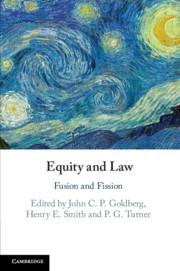Book contents
- Equity and Law
- Equity and Law
- Copyright page
- Contents
- Figures
- Table
- Contributors
- Acknowledgements
- Abbreviations
- Table of Cases
- Statutes
- 1 Fusion and Theories of Equity in Common Law Systems
- Part I Legal Systems and Legal Institutions
- 2 Equity
- 3 The Union of Law and Equity
- 4 What Did the Makers of the Judicature Acts Understand by ‘Fusion’?
- 5 At the Crossroads of Fusion
- 6 Fusion–Fission–Fusion
- 7 Fusion without Fission
- 8 Are Equity and Law in Scotland Fused, Separate or Intertwined?
- Part II Fusion and Fission in Doctrine and Practice
- Part III Functional, Analytical and Theoretical Views
- Index
5 - At the Crossroads of Fusion
British North America/Canada, 1750–2000
from Part I - Legal Systems and Legal Institutions
Published online by Cambridge University Press: 26 July 2019
- Equity and Law
- Equity and Law
- Copyright page
- Contents
- Figures
- Table
- Contributors
- Acknowledgements
- Abbreviations
- Table of Cases
- Statutes
- 1 Fusion and Theories of Equity in Common Law Systems
- Part I Legal Systems and Legal Institutions
- 2 Equity
- 3 The Union of Law and Equity
- 4 What Did the Makers of the Judicature Acts Understand by ‘Fusion’?
- 5 At the Crossroads of Fusion
- 6 Fusion–Fission–Fusion
- 7 Fusion without Fission
- 8 Are Equity and Law in Scotland Fused, Separate or Intertwined?
- Part II Fusion and Fission in Doctrine and Practice
- Part III Functional, Analytical and Theoretical Views
- Index
Summary
The story of the fusion of law and equity often centres on the story of New York state, whence the Field Code went forth, or of England. This chapter shows the more varied experiences of fusion in colonial British North America, and the degree of experimentation pursued by colonial governments that differentiated the local arrangements – and means of administering equity – from the arrangements at ‘home’ in England, or those in New York state. Initially, equity was often administered only by the governor or colonial council – or by a court of concurrent legal and equitable jurisdiction. Specialist Courts of Chancery came later, and were criticised as the confederation movement grew. Later, the legal colonialism set in which saw the ways of administering equity in England mimicked in the colonies. Even then, local variation survived as in relation to the treatment of mortgages.
- Type
- Chapter
- Information
- Equity and LawFusion and Fission, pp. 97 - 117Publisher: Cambridge University PressPrint publication year: 2019

